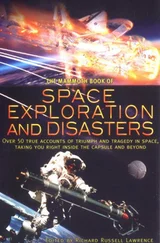“Give it to Korzun,” he said.
The second fire extinguisher Tsibliyev left on the wall. Training rules dictate always leaving one behind, in case a fire should break out in the module. Linenger took the extinguisher from Tsibliyev and ricocheted back into base block, where he was met by the sight of thick black smoke pouring into the module from Kvant. Handing the extinguisher to Kaleri, he could not see his hand in front of his face. Tsibliyev followed right behind and immediately heard Korzun shouting for more fire extinguishers. Tsibliyev and Linenger turned around and flew quickly to Kristall, where they recovered one more extinguisher, which they handed to Kaleri in base block.
Lazutkin, meanwhile, heard Korzun’s order to prepare for emergency evacuation, headed through the node and into the Soyuz in which he, Tsibliyev, and Linenger would return to Earth. “We were like Pavlov’s dogs,” he remembered. “We have been trained to fulfill the [commander’s] orders. If you have a command, don’t think. Do it.” Lazutkin hunched over and began to detach the dozen or so cables draped across the entrance, including the six-inch-thick white ventilator tube.
“What’s happening?” Tsibliyev asked Lazutkin after a moment.
Lazutkin glanced back into base block. “It’s completely dark,” he said.
“You can’t breathe.” Together the two men shut the capsule’s door to prevent smoke from seeping in.
While his comrades swarmed through other parts of the station, Korzun reentered Kvant to fight the fire, alone. He hovered directly by the near wall with base block, his feet sticking through the hatch into the crawlway between the two modules. Kvant was now totally dark, smothered in smoke.
To Korzun, who could not see his own hands, the flame itself appeared only as a bright white glow, perhaps two feet long, beneath him in the murk. He took the second fire extinguisher, turned on the foam, and shot it in a stream at a point where he believed the fire was hottest. It was difficult to tell, given the visibility, but after thirty seconds or more he didn’t believe the foam was having any effect. The flame was shooting out so fiercely, it seemd to be blowing the foam away. Korzun saw glowing particles of foam swirling around him in the dark. “It didn’t seem to be working at all,” he remembered. “The fire was too strong.”
Korzun turned a knob on the fire extinguisher and switched his stream to water, spraying it all around the glowing white flame. He was struck by how eerie the situation was. With the ventilators shut off, the station had gone quiet. The only sound, other than the occasional muffled comments of Kaleri or one of the others behind him in base block, was the sound of the fire. It hissed at him – “like fried eggs in a frying pan,” Korzun said later.
At first Korzun didn’t think the water was working either. He directed the stream toward the center of the hissing white glow but couldn’t be certain it was hitting the flame. And then, after a minute or so, the fire extinguisher gave out. There was no more water. Korzun turned and slipped back through the hatch into base block.
“I need more fire extinguishers!” he shouted.
Kaleri handed him the second unit from base block, and Korzun quickly ducked back into Kvant to face the fire.
None of the astronauts admitted to any real fear as they fought the fire. Ewald said:
You trained with the Soyuz to believe you can escape in your Soyuz in all circumstances. Return to Earth is assured in your mind. Even in the worst circumstances, in face masks, you think like that. You can come down. What I thought, after some seconds, after some action, I thought this would be the end of my two-week science mission. I wouldn’t get any results from my science. [When I returned to Earth] I would get a big hug, a big clap on the shoulder, but the results would have been zero for my flight. This was the end of my mission. “Sounds professional, right?”
But as Ewald hovered amid the smoke in base block, a numbing realization struck. “Our Soyuz was on the far side of the fire,” he recalled. “It was quite clear that we would have to go through the fire to our Soyuz.” As Ewald hovered there in base block, now thoroughly filled with thick black smoke, he briefly considered making a dash for the second Soyuz, to begin powering it up for evacuation. But no sooner did the thought occur than Ewald banished it from his mind.
Ewald remembered:
“I’m in the military hierarchy on board; I do as I’m told. I’m not there to make up my mind and do things out of a heroic feeling. You do what the commander tells you to do. Even if I could have been some help, you do what the commander tells you, so I stayed [in base block], not because I was a coward, but because it is best to do things in an orderly way.”
When Korzun returned to the fire with his third fire extinguisher, the glow beneath him seemed somehow smaller. He began blasting water directly at it. At about this time he heard Linenger behind him.
“How are you?” the American shouted through his mask. “Are you okay?”
Linenger was the crew’s only doctor. It was his unofficial duty to check on Korzun’s health, but the commander was unable to focus on what he was saying. He was too busy directing the stream of water.
“Yes, Jerry, I am fine!” he shouted back over his shoulder. “Stay there in base block!”
After a few moments, Korzun added some additional comments, ordering Linenger to keep a close eye on the crew. Smoke inhalation was a real danger.
It was at about this point, Korzun remembered, that the size of the white shining beneath him appeared to be shrinking. He kept the water on it, but inch by inch the flame appeared to be dying out. Korzun didn’t remember making anything like an expression of victory or relief. His pulse was still racing, and he was breathing heavily inside his mask.
“Jerry!” Korzun hollered.
Linenger floated up to a position directly behind Korzun. “I need you to prepare help in case anyone is injured,” the commander said. “Check all the American FA [first aid] boxes, see what they have in them and what can be used. Check all the Russian FA boxes, as well. See what’s in those.”
Linenger immediately sprang across the length of base block to the node, then turned and shimmied into Kvant 2, where the medical supplies were stored.
A moment later the shining beneath the commander seemed to disappear. Korzun took a deep breath but kept the stream of water pointed downward.
“It’s over,” Korzun told Kaleri. “I think it’s over.”
The smoke was slowly dissipating in base block as all six crew members, still wearing their oxygen masks, gathered for the next comm pass. The damage appeared to be limited to the SFOG itself, which was destroyed, and the nearby wall panels, which were badly scorched. The hull was intact. Still, Korzun was unsure what to do. He needed guidance from the ground on whether it was safe to remain on board; no one was sure what gases had been released into the station’s atmosphere. Both Soyuz escape craft stood ready for immediate evacuation. They were flying across North America now, moving into range of the radar station NASA operated at Wallops Island, Virginia. The quality of transmission over Wallops was never strong, but it was all they had. When they came into range, Korzun began to speak into his headset microphone, describing what had happened.
There was no reply.
Korzun repeated himself in Russian, then in English. On the other end of the line there was only static.
“TsUP, guys, we cannot hear you,” he said, speaking in clear, deliberate sentences. “We have had a fire aboard! We managed to extinguish the fire. The oxygen canister began burning. We extinguished it after using the third fire extinguisher The crew is wearing oxygen masks. The pressure is O 2equal to one-five-five. PCO 2is equal to five-point-five. There are nine masks left. After we take off the used masks, if we feel worse, we will put a new set of masks on and go to the [Soyuz] capsule. We will be situated in the capsules. The smokiness of the atmosphere is below average. But we don’t know the level of toxic gases.”
Читать дальше












